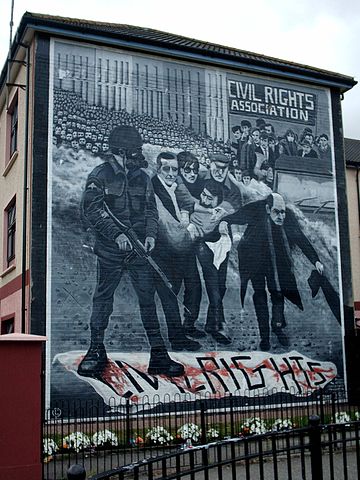
(Photo: Bloody Sunday Mural by Keith Ruffles)
The Public Prosecution Service (PPS), the principal prosecution authority in Northern Ireland, has concluded that there is “insufficient to provide a reasonable prospect of conviction of any of the 15 soldiers” who were charged with the unlawful murder of 13 civil rights activists in January 1972, during Bloody Sunday.
The PPS has only brought charges against one British soldier for his conduct. The soldier has been dubbed “Soldier F” in the case. He is to stand trial for the murder of James Wray and William McKinney in Derry as well as five counts of attempted murder.
This decision follows a review of the case of 15 veterans who are accused of opening fire on civil rights activists protesting detention without trial. The incident, which took place in Londonderry, in January 1972, led to the murder of 13 people and 15 people being injured.
Responding to the decision, the Taoiseach (Ireland’s Prime Minister) has expressed “deep disappointment” at the results and stated that the decision will "bring back pain and loss" for the Bloody Sunday victims and families. He further added that space should be given to families to decide where to challenge to the decision in the High Court.
Lawyers representing the families and victims of Bloody Sunday maintain that a further 10 soldiers should be facing prosecution charges.
Ireland’s Social Democratic and Labour Party leader, Colum Eastwood, maintains that the families of the victims would not be deterred now.
"They are people who have walked this very long walk, full of dignity and full of pride and not deterred by anybody".
Kate Nash, whose brother William was among those killed, expressed disappointment with the decision but maintained that she would “carry on” her pursuit for justice. Her solicitor Darragh Mackin said they would now be seeking a judicial review of the decision.
John Kelly, whose brother Michael was killed, also maintained that despite the knockback they would “continue on to achieve truth and justice”.
"Michael was 17, Michael cannot speak for himself. I will do it for him."
Read more from the BBC and the Guardian

